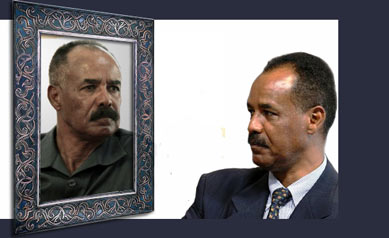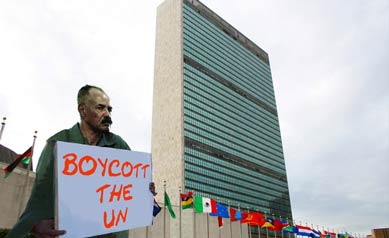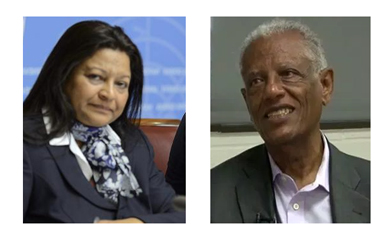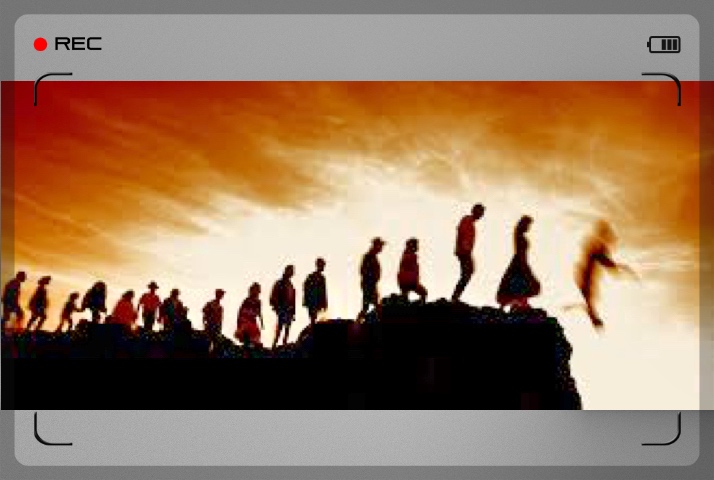Interview: Isaias Plans To Command Economy, Society

In an interview conducted by EriTV, Eritrea’s state television, which is owned and operated by Isaias Afwerki, Eritrea’s Auditor General, Isaias Afwerki, conducted a thorough assessment of Eritrea’s President, Isaias Afwerki, and found him wanting in all aspects. The take-away message from the two-part interview is one: the government intends to have more command and control over every aspect of Eritrean lives and the president has total control over the government and the ruling party.
Occasionally, the Auditor would give way to the President, who would give a defense of his performance, giving a litany of data. And these factoids are either effects uncaused, like the emergence of the periodical cicadas must have appeared to people of yore, or facts all hanging suspended, and in contradiction to one another.
It’s one thing when the contradiction is over a three-year period, such as his regressing view of Ethiopia’s building of the Millenium Dam. Isaias 2014: The Nile River deal dictated by colonial Great Britain was unfair to Ethiopia and just because we are in a state of war with Ethiopia doesn’t mean we have to deny their right and just cause to build a dam; Isaias 2015: nobody can stop us from buying electric power from Ethiopia: Isaias 2016: the building of the Millenium dam was based on emotional decisions and will not benefit the people of Ethiopia. (We will talk about that in Part 2.)
Sometimes, the contradictions are in the same interview, two questions apart. For example, he argues: We must have better command and control over the market and currency because, thanks to speculators, nobody knows what happened to the surplus harvest of 2014. Later on, he says we are better prepared for the drought of 2015 because we had the foresight to store the surplus from 2014.
In this edition of Alnahda, I will focus on the domestic affairs part of the interview (Part 1.) The topics that were discussed are: (1) Change of Nakfa Notes; (2) Raises to Civil Servants and members of the National Service; (3) Food Security; (4) Housing; (5) Corruption; (6) Civil and Penal Codes; (7) Strengthening the Front and Drafting the Constitution. In each one, I will attempt to show that they all have one thing in common: Command & Control.
1. On The State Media
I will begin with one that didn’t make it to the list, but you can see it from the interaction of the journalists with the President: command and control of media. Here’s how it works: around the end of the year, the president provides a list of topics that he would like to campaign on for the coming year. And by that I mean: topics he would like to be used to “raise the consciousness of the people” (aka: brainwash.) These topics are then changed into questions by the Ministry of Information and handed to the designated journalists. How do I know this? No, not because of that. Because: during the interview, the president tells the journalists (a) the people who wrote the questions for you didn’t do it right and (b) we will address this issue in your subsequent question. And when the poor journalist who didn’t write the questions is just following the script which directs him to ask about, for example, political developments and the interviewee says, “what political developments?”, the journalist has no idea and has to grin sheepishly.
But remember the contradiction I mentioned? Here’s one more: the president has to appear that he is in full control—he knows the prices of a kilo of wheat, and the precise language of a press release issued by the Ministry of Foreign Affairs—but he also has to show he is just a member of a team he delegates: he doesn’t know the Nakfa exchange rate and he doesn’t know whether the Ministry has submitted the names of all its employees so they can get their raise.
2. On the Nakfa Notes Change
The president gave 3 reasons for why it was necessary to change the currency, one of which has been officially promoted from 03 (Bado Seleste, zero 3, the radio channel used in the Eritrean field to discuss non-secret idle chat) to, let’s say, 01 (an official explanation): that Enemies of the State may be planning to flood the country with counterfeit currency. (Even shabait was embarassed by this and didn’t publish it in its reportage.) The second reason was to combat hoarding of cash and disrupting the market. The third reason has to do with the underperformance of Eritrea’s financial institutions (banks, Inland Revenue, etc.)
Notice that all of them are about tightening the controls. So here is Isaiasnomics explained: command economics work if you actually, truly command all aspects of the market: supply, demand, prices, investment, production, distribution, regulation, taxation. All of these have values and the measure of value is money and the command process begins with confiscating money and then ordering those who withdraw their own money in excess of the allowance permitted by Baba Isaias into giving a rationale (in writing, like applying for a visa to a foreign country) and, when necessary, to deny them (control.) This has already begun with the grain market: merchants have been told they can only withdraw 20,000 Nkf and they have to explain why they need more: purchase grain, transportation costs, storage costs, employee wages.
You then continue asking all sellers to justify their sale price: how much did you buy it for? How much profit are you making? How much are you renting your room for? How much taxes did you pay? This applies at the micro level down to how much a bus fare should be. (He actually gave that as an example.)
3. On The Raise
Yet another piece of news that had not been published in any official media but had made the rounds in the unofficial media (the original source was a pen name on Facebook) was that Eritreans in the armed forces and the civil service will get a significant increase: from 500 Nakfa to 2000 Nkf (for Sawa High School diploma-holders) and 3,500 Nkf (for degree holders.)
Now this being one of those subjects that had been under discussion since 2010 (when the government told the civil service that the raises they were about to give them were re-allocated to fight the Hasadat America and their sanctions), it had a ring a truth and now it is confirmed.
Here, the Auditor General goes into a long soliloquy badmouthing the salary that the President had been paying the people. Will the change in currency or the raises work? We shall see, patience, don’t rush, camel, tortoise, etc. The Chairman of Eritrea’s Federal Reserve (Isaias Afwerki) has a few tools in his tool kit (ab jubana zHaznayo alena) where the Nakfa’s purchasing power will be fine-tuned by commanding the economy (a wrench here, a screwdriver there, presto.)
Now, you say, how is this about command and control? Remember, all the members of the National Service have to report to their units and confirm they are members in good standing, and appear in database of those in active duty BEFORE their raise takes effect. Khtet! That’s the control. Unfortunately, those who consider the raise a tiny factor in their dissatisfaction with the country’s governance will continue to trek out of the country, as we will learn when the January reports are published by UNHCR.
4. No Rain No Famine
2015 was a bad year for rain in the region, how will this affect us? “Xegem yelen! No problem,” he answered, like Temesghen Yared. (bittersweet, again.)
First, he disabuses all the Diga (dam) enthusiasts of the notion that Eritrea is a country that is benefiting from irrigation (“b’afka ktzarebu qelil iyu”) by saying that there are vast areas of the country, particularly in the Northeast, that could benefit from irrigation but nothing has been done. Then he reminds us that Eritrea is a country that depends on rain-fed agriculture. You don’t say!
Where does the command and control come here? It goes like this: if you want to make sure that even in times of drought we won’t have famine, trust a government that had the foresight to store in time of grain surplus. This is something only the government of Eritrea can do! What? Never mind your biblical story of how Joseph, who lived in 1500 BC, was Chief Steward in charge of granaries that fed Egyptians for seven dry years. (Hush)
5. Housing
Construction is suspended in Asmara (bulldozing is a booming business in other parts of the country, they say) because whatever plans he was presented, he explained, he found “unpersuasive.” Fundraising for housing construction is something that the government had milked the Diaspora Eritreans dry to the point that madote.com, a strongly pro-government website, had one mildly critical article of the government: we gave you all the money, where are the houses? As I tweeted to the kiddies at madote, yes, housing is an important infrastructure for a nation’s development but you were not arguing from the standpoint of the tenant but the rent-seeking landlord craving his vacation home.
Well, here the Auditor General all but said: no more housing in Asmara because the utilities that the government has to provide for such new homes—water, roads, electricity, public transportation, social services (schools, hospitals)—are beyond its scope. The Diaspora Eritreans have to get newly acquainted with the rest of Eritrea—which has even worse public services. So, until we find a new partner (Emiratis have decent architectural companies but they are too busy constructing a runway in Asab) that is out of consideration.
And where does the control come in? It comes in the form of asking landlords to justify their prices, to apply rent control and to tax heavily.
6. Corruption
The president created a syllogism which goes like this:
(a) All national security risks can be traced to corruption
(b) All corruption can be traced to greed
(c) I am neither greedy, nor corrupt: Eritrea’s national security is safe.
Therefore? Since this is the part where he was getting terribly animated and his nostrils were flaring, I will do him the honor of quoting him extensively. I will add some words in brackets to show him that what he finds most objectionable (greed, financial embezzelment) is what the Eritrean opposition finds most objectionable about him (greed, power monopoly):
“To demand what you didn’t work for; to demand what you didn’t sweat for, to snatch the plates of others [by becoming a president for life]; to consume ten plates when others haven’t gotten one plate… who are you? Why are you so privileged? Do you understand the problems you are creating [by creating a one-man state]? If you are unable to control the handful of greed-drunk people, why did you pay so much sacrifice for this country? Why did we embark on such a long journey? Why did all the people pay so much sacrifice to get to this point? Based on much hope and yearning, the people have overcome countless challenges, and now to be deceived by 2-3 people? This is not a matter of choices: it is matter of existence or non-existence. This is not something you postpone for later action. In the past few years, an excuse of “poor living conditions” [and he led the Front that brought abut liberation] was used to tolerate such behavior: abusing government property [and government power] and hustling for money from various sources. But just because your living conditions are hard [or you led a Front] doesn’t mean you have a license to steal [and rule for life]…so: zero tolerance.”
And the control? Now campaigns against corruption are synonymous with one and only one thing for the PFDJ dating back to the days it was EPLF: targeting political opponents. These campaigns always have catchy slogans—“The Three Privileges”, “Before It Takes Root”—but all it means is that the Eritrean prisons will host more people without due process or self-defense.
7. Civil Code and Penal Code
Rules, laws are areas where the president is at his least articulate: it is the only time he uses the word “gele mele” (stuff like that.) But it is the stuff that animates the intellectual class of the PFDJ despite the fact that penal codes and civil codes the world over are almost identical. In fact the one we had been using for 25 years is borrowed from Ethiopia, which was borrowed from French civil/penal code. There is a lot of talk about how the civil/penal codes of Eritrea use indigenous mechanisms: yeah, to a point. I doubt a rapist will be allowed to have an arranged marriage with his victim. So, please enough with the cultural-fetishes.
I don’t think I need to make the case that this is about control: it is self-evidently true when you are talking about pages and pages of a penal code which tells you how much the State will sanction the citizen.
8. About the Much Promised Strengthening of Front and Drafting Constitution
This one also didn’t make to shabait’s reportage on the interview. Unsurprisingly, the always-alert constitution-booster Eritreadaily.net is the first to capture its significance. As you can see from the chopped video (7 minutes), the interviewer asks about “drafting of constitution” and the president corrects him and tells him he is not thinking about the constitution but “srAte mengisti”: the structure of the government. That is to say: just like the government wrote a civil code and penal code without reference to a constitution, it is going to write “electoral law” and “laws on political organizations” without a constitution. Then there will be a lot of “gosgwas” (campaigning) to educate the masses via seminars and state media and, after sufficient saturation and correct education (on the merits of one party state and the dangers of parliament of political whores that multi-party systems encourage), then there will be a referendum.
There was a reason that some of us grieved when the 1997 Constitution was declared dead in May 2014, and those of you who were assuring us a new one is coming are mistaken.
Here’s another contradiction: In the same month that saw the Independence Torch lit in Nakfa, on the eve of Operation Nakfa festival, in the same month that the Festivals Coordinating Committee is planning the celebration of Eritrea’s 25th Anniversary of its independence, President Isaias Afwerki says: “We are done celebrating the historic achievements of the EPLF, let’s focus on the future.” But what is the future? Wait for it.
The journalist (Paulos) reminds him about the issue of strengthening the Front. Ummm, “I have written a good article about that; perhaps, I can give you a copy.” Apparently, it is about the sovereignty of people and their right to choose a one-party state, a two-party state, a ten-party state but one that recognizes the People’s Front is here to stay yesterday, today, tomorrow. To infinity and beyond. And those of you who have a different vision are kindly invited (again) to find a home in another world.
Conclusion
It is difficult to listen to the president’s interview because he views everything within a 15-25 year context which is fine if he can resist the urge to give a tutorial on the Cold War, the New World Order and Fukuyama every single time, and he simply can’t. For example (and this is from Part 2), a question like “why did we choose to endorse the Saudi Coalition Initiative To Counter Terrorism?” has a simple answer that would take less than a minute: “Because, unlike the coalitions organized by the US and Russia, this one is actually organized by a regional power and we concluded that what it is combatting directly affects our national security.” That is it if you are for supporting the initiative of a country that is the ideological birthplace of Jihadism. But noooo. We have to be given the Modern History of the World tutorial which takes a good 15 minutes.
When an idea fails, is it because it was badly executed or is it because it is a bad idea? Unreformed communists believe that communism didn’t work because it was not properly executed—and, from the interview, it appears that the President belongs to that camp: command economies can work if one applies tighter controls on all aspects of the economy and its politics. If he can make it work, Eritrea will be the first country in history to do so (Russia couldn’t, China couldn’t.)
What he is proposing is a dark vision of humanity: people have to be brainwashed and tightly controlled in all aspects of their lives, for the sake of the “greater good.” It has failed and it will continue to fail miserably; the tragedy is that it is the Eritrean people that continue to pay for the experiment particularly when the experimenter has never once admitted error. And those who argue liberalizing is the way to go have not yet reached the tipping point.
To be continued with Part 2 of the Interview focusing on international issues.




Awate Forum